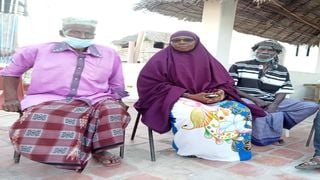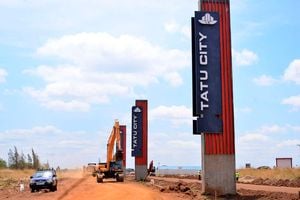
From left: Noya Abuli of Basuba, Khadija Gurba of Mangai, and Rufi Alio Ware of Kiangwe.
| Kalume Kazungu | Nation Media GroupLamu
Premium
Why Boni villagers want a piece of forest operation budget
The Boni minority community is pleading with the state to include them in the budgetary allocations for a security operation so as to cushion them from hunger and poverty.
The Boni blame the ongoing Operation Amani Boni for stifling their economic activities, resulting in their current woes.
The operation was launched in 2015 with the key objective of flushing out Al-Shabaab militants said to be hiding in the forest.
Back then, the national government promised to provide food aid and other humanitarian assistance to the Boni when all their villages, such as Pandanguo, Bodhei, Milimani, Basuba, Mangai, Mararani, Sankuri, and Kiangwe, became operations zones.
Speaking to Nation.Africa on Monday, the community said the national government had failed to keep its promise to provide relief food.
The relief food distribution programme was introduced and lasted just a year but was later stopped.
Boni spokesperson Ali Sharuti now says the national government should include the Boni every time a budget is allocated for the security operation.
Not to set foot in that forest
“The State should understand that the Boni people don’t have anywhere else to get food or water apart from the Boni forest. When the Boni security operation kicked off, they asked us not to set foot in that forest or even go close to it until the operation was over,” said Mr Sharuti.

Lamu County Commissioner Irungu Macharia says said that the national government was supporting all vulnerable households in operation areas, including Boni forest’s villages, and across Lamu County through monthly cash transfer.
He added: The few crops we tried planting have dried up because of the drought and so have the wells. The situation is bad and we really need help.”
Noya Abuli, an elder in Basuba, said the government had failed to focus on other sectors crucial for the socio-economic development of the region and has put all efforts in security alone.
Mr Abuli noted that sectors such as health, education, transport, and agriculture have been neglected as the government chooses to focus only on insecurity.
The community, he said, is poorer and residents have become beggars who now have to depend on handouts for survival.
“We appreciate the fact that security has been restored in our villages but on matters of health, our women and children suffer and even die every time due to the lack of hospitals and food,” he said.
Khadija Gurba, a community leader in Mangai village, reiterated that since the operation started eight years ago, the Boni, who are traditionally hunters and gatherers, haven’t been allowed to venture into the Boni forest to search for food.
Ms Gurba urged the government to reopen dispensaries and schools that have remained closed since 2014 so that the community can enjoy the services like others in other parts of the country.
Access to the Boni forest
“The community is suffering due to lack of food. We don’t have hospitals and schools. All this needs to be addressed urgently. Our pregnant women and babies are dying almost daily here,” said Ms Gurba.
Rufi Alio Ware, of Kiangwe village, urged the government to allow them some access to the Boni forest so that they can hunt for food and get water.
“If they don’t want to help us, they should let us back into the forest. We have always had plenty of food and water there. Instead of letting us die of hunger, they should let us go back to our old lives,” said Mr Ware.
Lamu County Commissioner Irungu Macharia, however, said that the national government was supporting all vulnerable households in operation areas, including Boni forest’s villages, and across Lamu County through monthly cash transfer.
“Further, we are collaborating with other stakeholders like the Kenya Red Cross Society in undertaking projects aimed at diversifying livelihoods among the Boni people. They are highly encouraged to start small-scale farming and livestock keeping,” said Mr Macharia.





